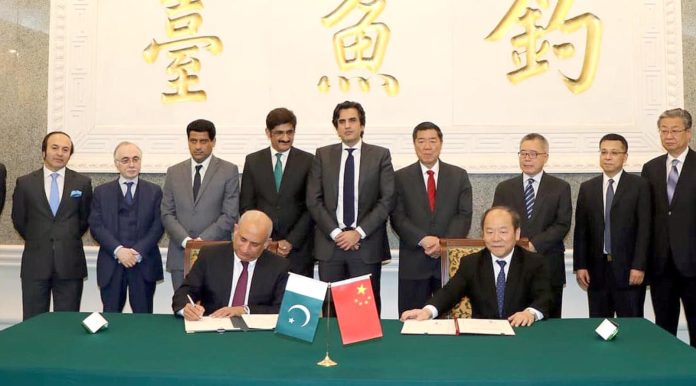ISLAMABAD: The meeting of 8th Joint Cooperation Committee (JCC) on China Pakistan Economic Corridor (CPEC), which started on December 20, concluded in Beijing on Friday with memoranda of understandings (MoUs) signed by the two countries for cooperation in agriculture, industry and social sectors.
Sources, however, claimed that unlike previous meetings of JCC, no specific mega project was approved in the meeting of the highest forum of CPEC. They said that China has not approved any new project proposed by the Pakistani side, but agreed to deliberate and discuss them through joint working groups.
The Pakistani side has reportedly urged officials in China to convince Chinese private firms to invest in special economic zones (SEZs) identified under CPEC in Pakistan, because so far, no major Chinese firm has shown its interest in SEZs.
Minister for Planning, Development & Reform Makhdum Khusro Bakhtiar, who represented Pakistan for the first time at the meeting, has reportedly urged Chinese side to invest in the agriculture sector in Pakistan especially in value-added food, cold storage and training of farmers.
An official statement by the planning ministry claimed that the 8th JCC has set new targets for Pak-China cooperation, leading CPEC towards becoming a true economic corridor.
After the conclusion of the JCC meeting, the statement said that the CPEC’s scope was expanded by opening its doors to industrial cooperation, agriculture and socio-economic development. “Pakistan and China have agreed to further strengthen the JCC mechanism through increased frequency of exchanges,” it said.
The planning minister said that signing of MoU on industrial cooperation would steer Pakistan into a new era of industrialisation and will expedite the development of special economic zones by relocation of Chinese investments.
According to him, Pak-China cooperation in the agriculture sector would focus on attracting investment in food production, processing, logistics, marketing and exports in joint ventures (B2B) with Pakistani companies. The cooperation would transform Pakistan’s agriculture economy, benefiting from Chinese technologies, experiences and supply-chains that would help Pakistan to significantly grow its exports, he maintained.
The first meeting of the joint working group (JWG) on agriculture in this regard is planned to be held during the first quarter of 2019.
Makhdum Khusro Bakhtiar further announced that newly established JWG on socio-economic development has devised an action plan that will provide a guideline for future cooperation in education, agriculture, poverty alleviation, skill development, healthcare, water supply and vocational training projects. Development initiatives in these sectors would be launched in a short span of time to uplift less developed areas particularly Balochistan, as well as southern Punjab, southern KP, northern Sindh and Gilgit Baltistan (GB), he underlined.
According to the statement, in the next phase of CPEC, two sides also agreed to cooperate in the maritime sector, port development and automobile sector. The future focus of the energy sector will remain on power projects based on local resources and transmission lines projects, following an integrated energy plan.
The minister also vowed to promote the development of hydel projects in Jehlum Cascade and GB.























